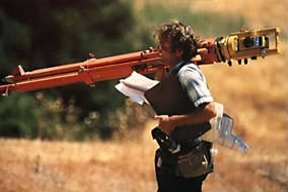This course has been discontinued.
This 2 hour interactive online course presents ONE interesting land boundary case that is particularly instructional as to the proper application of the principles of boundary location for METES AND BOUNDS parcels. It introduces many of the principles of boundary surveying in a systemmatic fashion.
The problem statement will suggest alternate approaches, principles, and solutions. You must solve the case according to what you think is the proper application of survey principle. You will then compare your solution with DAVE GIBSON''S 'best practices' solution which incorporates the correct application of boundary location principles. Defense for the 'best practices' solution will be given for consideration and further learning by the attendee.
If you love to discuss tough boundary location situations, then you will love this case and learn something new. You will also learn other viewpoints for your consideration. The beginner can benefit from the instruction they give as much as the experienced practitioner.
This course is a portion of the longer 6 hour course titled 'Dave Gibson''s All Star Metes and Bounds Boundary Cases' also offered on RedVector.com.
This course includes a multiple-choice quiz at the end.
Vector Solutions has a long history of providing industry-specific content for its customers. While this course and its content remain accurate and functional within our systems, the look and feel may not match our more modern offerings.
At the conclusion of this course, the student will reach the following objectives:
- Given a metes and bounds boundary situation involving conflicts, the student should be able to list the range of viable solutions for the situation along with the principles that support each solution.
- From among the viable solutions, the student should be able to identify, present, and defend their own solution.
- After presenting a solution and comparing it with DAVE GIBSON''S 'best practices' solution, the student should be able to identify the differences and understand the reasons behind the 'best practices solution,' thus sharpening the practitioner''s application of principle.
All Course Materials Copyrighted
Dave Gibson, 2002







